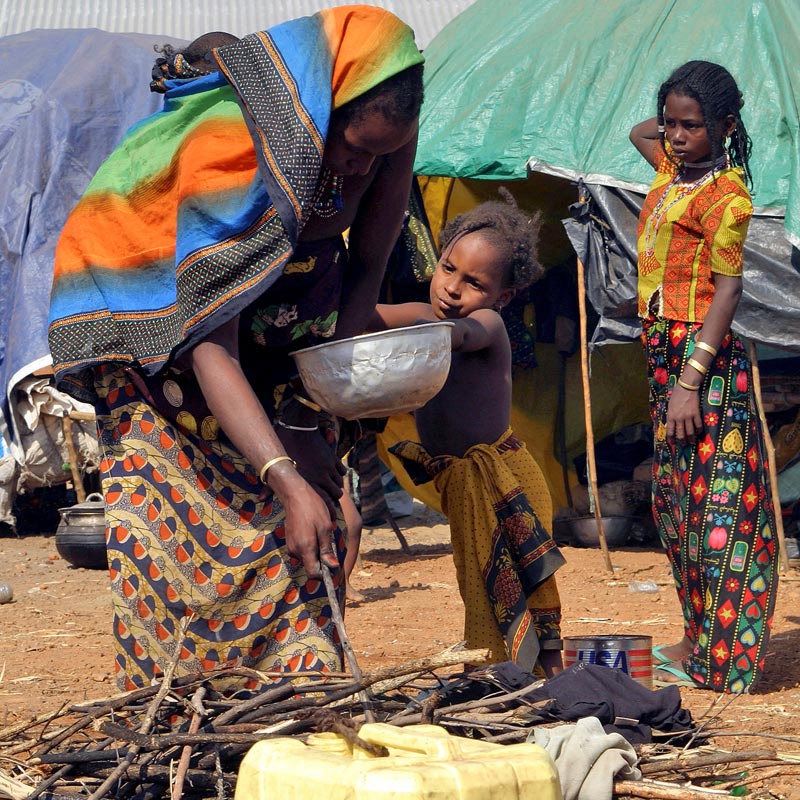It is my pleasure to welcome you to this occasion — the conferral of the second MacArthur Award for International Justice on Richard Goldstone.
We welcome him, his family, friends, colleagues, and many admirers.
We welcome the judges, prosecutors, defenders, and other legal practitioners who, with hope, integrity, and determination, are building the system of international justice, here and around the world.
We also welcome the ambassadors and delegates from 32 countries who are here — your presence expresses the breadth of support for the cause of justice.
We have many representatives of the civil society organizations that work on the frontlines for justice and human rights with us tonight — we welcome you and applaud your brave and effective work.
And we are glad to have media representatives and journalists with us.
Advancing human rights and justice has been central to MacArthur’s mission for thirty years. We have supported more than 600 institutions in the field, working on the frontlines in 90 countries to expose human rights abuses, promote media rights, and strengthen the rule of law. Our grantees in Russia, Mexico, and Nigeria have been in the forefront of protesting police abuse, combating discrimination, and upholding the right to due process and a fair trial.
We also have a deep interest in helping fashion an integrated system of international justice that includes special tribunals impaneled by the United Nations, regional human rights courts and commissions, and, at its center, the International Criminal Court.
MacArthur believes that international criminal justice is an idea whose time has come. As Slobodan Milosevic, Charles Taylor, Augusto Pinochet, and others fall from power and are held responsible for their actions, as perpetrators from the Cambodian “Killing Fields” are called to account, as the ICC tries its first cases, we see the age of impunity coming to an end.
But to move forward, the international community needs to stand behind its commitment to the Rome Statute, and enforce the ICC’s arrest warrants in Northern Uganda and Sudan. We have seen, notably in the case of Omar al-Bashir, a reluctance among some states to honor their obligations. Now is the time for us, committed as we are to the system of international justice, to call upon the nations of the world to bring Joseph Kony, Ahmad Mohammad Harun, Ali Kushayb, and Omar Al-Bashir to The Hague. Only then can we say with confidence that a new era of accountability has taken hold.
Last year, MacArthur honored Kofi Annan with the first MacArthur Award for International Justice. He called us to a new appreciation of our common humanity, expressed through legal institutions. Hear his words: “Our understanding of international law has profoundly changed…. State sovereignty is not an absolute good in itself but an instrument … which has value only in so far as it is used to protect human life, to ensure respect for human dignity, and to uphold human rights.”
This is the rationale for an effective system of international justice — not to infringe on the rights of nations, but to uphold the rights of all their citizens.
Those rights depend on governments that fulfill their responsibilities to their people. The world has begun to acknowledge that, when states persecute or fail to protect their citizens, there is a moral obligation to act. MacArthur was proud to play a small part in establishing the Responsibility to Protect, a new norm that commits the international community to take steps to prevent genocide and mass atrocities.
Insisting on accountability helps prevent acts of gross inhumanity. Indictments, public trials, and appropriate sentences send a powerful message to those who would commit horrible crimes: there is no place to hide.
This evening, we pay tribute to an eminent lawyer and jurist who has made a crucial contribution to building the international system of justice. In Richard Goldstone, we have chosen someone “present at the creation” of the new era of international justice, a distinguished jurist and legal scholar, a person whose clarity of purpose, fairness, and credibility is a force that inspires all who labor in special tribunals, regional human rights courts and the ICC itself.
We could feel the force of his intellect and example in this afternoon’s panel discussion of how the elements of an international system of justice are coming together. We thank Lloyd Axworthy and the panel for a stimulating discussion.
MacArthur is fortunate to have a Board of Trustees that strongly supports our human rights and international justice work. It is my pleasure to invite the Chair of the Board, Robert Denham, to bring you the Board’s greetings.
* * *
We now come to the moment we have gathered for, the conferral of the MacArthur Award for International Justice.
May I ask Robert Denham to escort Richard Goldstone to the platform.
Let me now read the citation:
Courageous champion of human rights; respected pioneer of international justice; renowned litigator, jurist, and scholar:
Galvanized by a passion for the rights of all people since your student days opposing apartheid in South Africa, you embody the highest values of the law and demonstrate its power to restore ravaged societies.
A prominent advocate of the Johannesburg Bar, distinguished judge of the Transvaal Supreme Court and the Constitutional Court of South Africa, you made landmark contributions to ending apartheid and the peaceful transition to democracy.
Ruling that that people of color could not be summarily evicted from “white” areas, you undercut one of the prime pillars of apartheid. Upholding the rights of the Release Mandela Campaign against police seizures of documents, you kept open the possibility for free political expression. Visiting thousands of activists, detained without trail, you shielded them from assault, torture, and police abuse.
As head of the Standing Commission of Inquiry Regarding Public Violence and Intimidation, you revealed the activities of a violent and undemocratic “third force” and helped move South African toward legitimate elections and a government with a genuine mandate
As Chief Prosecutor for the United Nations’ International Criminal Tribunals for the former Yugoslavia and for Rwanda, you gave credibility and authority to the first international war crimes trials since Nuremburg. By insisting on independent counsel and judges, openly establishing the facts in each case, ensuring a strong defense and due-process protections for the accused, and gathering first-hand testimony from witnesses and surviving victims, you showed the world that international justice could be transparent, impartial, and fair.
Your work gave international justice new standing, preparing the way for the Rome Statute and the advent of the International Criminal Court. And it continues to set the benchmark for equitable, sound, and effective prosecution of atrocities.
Your counsel and collaboration is sought around the world to establish a true historical record and extend the reach of justice. From Argentina to Kosovo, from the halls of the United Nations to the offices of the International Bar Association, in the persistent conflicts of the Middle East, you bring your wisdom, insight, and sage advice.
You have magnified the impact of the courts and commissions you have served by your ability to articulate their principles and objectives. In universities, law schools, and public fora you present global standards in human rights and the law, expound the legal philosophy that underlies them, share your practical experience, and make a persuasive case for the promise of international justice.
Your hope is clear:
No longer will dictators or oppressive governments be able to violate the fundamental rights of citizens with impunity. We are moving into a new and different world…the twenty-first century will witness the growth of an international criminal justice system and that victims of war crimes will no longer be ignored.
The MacArthur Foundation shares your vision of a system of international justice that will further our highest ideals, punish and deter the worst atrocities, and nurture hope, human dignity, and deep reconciliation. For building the foundations of that system, demonstrating its viability in practice, and eloquently defending its principles across the world, we are proud to confer on you the second MacArthur Award for International Justice.
* * *
Thank you, Richard Goldstone, for that powerful message, profound insight, and compelling challenge.
You renew our determination and enthusiasm to make our time a new age of accountability.
Let us commit here and now to respond to your call.
On behalf of the MacArthur Foundation, let me thank you all for bearing witness to the honor we confer on Richard Goldstone and all who labor to make our world more just and peaceful. The energy, determination and optimism in this room fires our belief that an effective international justice system is within reach.
Good evening and safe travels.





